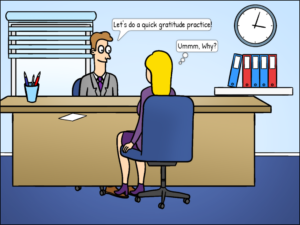Fr. Tim Shannon, of blessed memory, had an amazing ability to inspire – and raise money – with stories. And he could tell the same story – with the exact same words – over and over. I must have heard him 50 times say, “I told Mike Gill, my admissions director, that I wanted more students and I wanted better students.” I would marvel at it. It worked. The stories were compelling and people wrote checks. He pruned the presentation a (very) little, but the basic efficiency was extraordinary. On the other extreme, I have taught a leadership class about 25 times to undergrads at Berkeley, and I have changed it every single time. My wife laughs at me – she’s given up on getting me to change – and tells me it’s my choice, so don’t complain about the time it takes.
I have grooved one sacred routine, though, and I’m recommending you try it . . . today. Because it works. We begin every meeting by sharing our answers to two questions:
- Top-of-mind or center-of-heart, what are you grateful for in this minute?
- What are you grateful for when it comes to the work and/or workers?
We do it in our partner meetings, with individual coaching clients, with LeadingX2 pairs where we encourage them to answer question 2 about each other’s contributions, and with executive teams. In large groups, we’ll use breakouts for efficiency
Why practice gratitude at work?
- It brings us all into the present moment (out of preoccupation or post-occupation).
- Everyone participates right away.
- It opens us up to an abundance mentality.
- It reminds us of our shared humanity – our hearts and not just our brains (and egos) are on display.
But, I have some objections…
- It takes time. Really? Not much – a couple minutes. Sometimes, when we are in the habit of gratitude, but someone has a really tight schedule, we agree, “let’s do a quickie.” But gratitude sharing actually saves all kinds of time: the time of un-focus when people are preoccupied and miss something; or the time lost in frustration and argument when people are feeling great scarcity and little generosity.
- It’s artificial. This is also a good objection. On the personal level, however, if you practice gratitude – think about it and voice it to another – you will often create the authenticity. Your cognitive mind and your words will help you get in touch with what is genuinely good in your life. The practice unlocks authenticity.* And it may help fuel you as you face what’s challenging.
- You can’t make other people feel gratitude; for example if you are the boss, or suggest it to your life or business partner. It will just seem forced and insincere. Again, there is truth here. Gratitude without sincerity ain’t worth much. In rare cases it’s probably of negative value. For example, it’s hard to have people feel it when they are already mired in skepticism or cynicism toward the authority figure or the team. Then it can feel like one more instance of coercion or control on the leader/initiator’s part. In such cases, gratitude has to be followed with real engagement of tough root causes; although gratitude sharing it is not a solution, it can help foster an atmosphere of openness.
As to all these objections, I hasten to remind you: Leaders will always take flak! Moving people into this emotional space, will make some feel uneasy. Leadership always has an element of making people feel uneasy: If you’re asking them to face racism, climate change, or political correctness, there will be resistance. Why not lead into the sweet space of gratitude?!!
Gratitude (and positive leadership generally) are the scientifically proven way of the future (and happen to be embedded in every religious, spiritual and wisdom practice of old). Will you lead others to the great benefits of gratitude? When you lead with gratitude, you are quite literally . . .
Leading with your best self.
*Tara Brach is a genius at gratitude practice. This entire talk is great, but I point you to a 40-second clip, queued up right here, where she talks about the gratitude practice she does with her husband twice a week.

Dan — I can hear the Tim’s intonation of words in saying that phrase ring still in my head today. And I believe you have pruned your gratitude routine just a bit in 25 plus years from “What’s on your mind? What’s on your heart today?”
Mike,
I was talking about Tim and one of his assets – an eye for talent (other than hiring me). He put a lot of pressure on you, but you accepted it, and he gave you freedom and support to get the job done. And you always delivered.
AMDG!
Dan
He built a great team at The High — you included (I was a holdover from the previous regime!)… every day I think back about something that happened to me or something that I learned from those 6 years of my life.
Hi Dan – I didn’t know that Fr. Tim had passed away. He was certainly one of the bright, good lights here on Earth, and he leaves us at way too young of an age. I have gratitude for having met Fr. Tim, even if I didn’t know him as well as you clearly did.